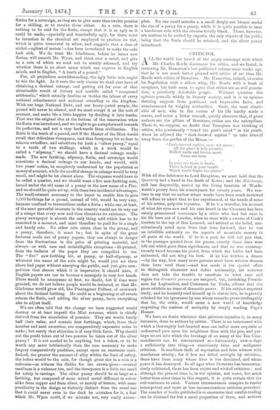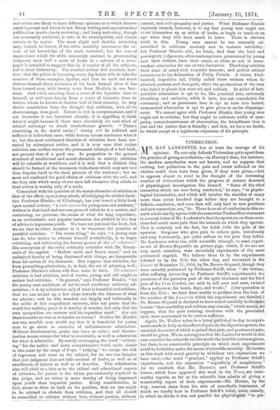CRITICISM.
ALL the world has heard of the angry contempt with which Mr. Charles Reade denounces his critics, and we found, in reviewing Mr. Hamerton's last-published volume some weeks ago, that he is not much better pleased with critics of art than Mr.
Reade with critics of literature. Mr. Hamerton, indeed, executes his flagellation with a silken whip, Mr. Reade with a leash of scorpions, but both seem to agree that critics are an evil genera- tion, a peculiarly detestable people. Without question this opinion prevails widely in literary society, and it is an opinion deriving support from pertinent and impressive facts, and countenanced by weighty authorities. Scott, the most charit- able of men, who in the course of his life hardly made a severe, and never a bitter remark, quietly observes that, if great authors are the pillars of literature, critics are the caterpillars. There is, we suppose, no doubt that 'Tennyson was thinking of critics, who persistently "vexed the poet's mind" in his youth, when he adjured the " dark-browed sophist" to take himself away from the garden of the Muses :—
"Dark-brewed sophist. come not mom.; All the place is holy ground ; Hollow smile and frozen sneer, Come not here.
In your eye there is death, There is frost in your breath Which would blight the plants."
With all due deference to Lord Houghton, we must hold that the Quarterly had a hand in the death of Keats; and the Edinburgh, still less disputably, sealed up the living fountain of Words- worth's poetry from his countrymen for twenty years. We ven- ture to say that no author whose works have been much reviewed will refuse to admit that he has experienced, at the hands of some of his critics, palpable injustice. If he is a traveller, his account of what his eyes saw and his ears heard in the Caucasus has been calmly pronounced inaccurate by a critic who had but once in his life been oat of London, when he went with a swarm of Cook's tourists to the top of Ben Lomond, and arrived at the belief, con- scientiously acted upon from that time forward, that he was an infallible authority on the aspects of mountain scenery in all parts of the world. If he is a poet, he will tell you that, in the passages quoted from his poems, exactly those lines were left out which gave them significance, and that he was contemp- tuously rated because his pistol, from which the bullet had been extracted, did not wing his bird. If he has written a drama —by the way, how many more persons must have written dramas than have read them i—and has made it his special effort to distinguish character and define nationality, his reviewer does not take the trouble to ascertain to what race and region the dramatis personx are assigned, but, mistaking French- men for Laplanders, and Chinamen for Turks, affirms that the piece exhibits no trace of dramatic power. If his subject required study, and he honestly read himself up in classic lore, he is gravely rebuked for his ignorance by one whose remarks prove irrefragably that he, the critic, would enter a new world of knowledge respecting the nations of antiquity by simply reading Pope's Homer.
We have no doubt whatever that grievous injustice is, in many instances, done to authors by critics. There is no instrument with which a thoroughly bad-hearted man can inflict more exquisite or undeserved pain upon his neighbour than with the pen, and per- haps no act into which the breakage of so many of the Ten Com- mandments can be concentrated as—fortunately, now-a-days a sufficiently rare thing—a consciously false and malignant criticism. It combines theft of reputation and false witness with murderous cruelty ; for if few are killed outright by criticism, there have been many whose lives it has desolated, and whose peace it has destroyed. In all ages when literature has been exten- sively cultivated, there has been unjust and wicked criticism ; and although the present time is, in our opinion, not worse, but mach better than other times in this respect, it is quite certain that the evil continues to exist. Various circumstances conspire to render incompetent and more or less unconscientious criticism prevalent. The number of books published is so enormous that careful reading can be obtained for but a small proportion of them, and authors and critics are likely to have different opinions as to which deserve careful perusal and which do not. Hasty writing and superabundant publication involve hasty reviewing ; and hasty reviewing, though not necessarily malicious, is sure to be unscrupulous, and almost certain to be unjust. The most slight and sketchy reviewing may, indeed, be honest, if the critic candidly announces the ex- tent of his knowledge of the work reviewed ; but the tone of omniscience which the critic commonly assumes in pronouncing judgment upon half a score of books in a column of a news- paper is intended to suggest that he is master of all his subjects, and is sheer dishonesty. The sensible author will recollect, how- ever, that the public is becoming every day better able to take the measure of those scampish Apollos, and that he need not much distress himself about estimates of his book formed after it has been turned over, with twenty more from Mudie's, in one fore- noon. And while smarting from a sense of the injustice done to himself, or still more keenly from a sense of injustice done to writers whom he knows to deserve well of their country, he may derive consolation from the thought that criticism, with all its shortcomings, does good. Nature is rich in compensations, and if our literature is too luxuriant already, it is appalling to think what it might become if there were absolutely no east-wind of critical contempt to check unwholesome growth. "There's something in the world amiss ;" wrong will be inflicted and suffered in individual cases, while human nature continues what it ; but the most celebrated blunders of criticism have been cor- rected by subsequent critics, and it is very sure that unjust criticism can neither secure the permanent triumph of a bad book, nor prevent that of a good one. In proportion to the general standard of intellectual and moral elevation in society, criticism will be valuable or worthless, and it is well that a distinct idea should be formed of the venomous wickedness which may now and then disguise itself in the sleek phrases of the reviewer ; but we mast not confound the good effects of criticism with the evil, and the fury into which many clever men fall whenever they allude to their critics is worthy only of a smile.
Connected with the question of the moral character of criticism is that of the effect, upon young minds, of indulging the critical facul- ties. Professor Blackie, of Edinburgh, has just issued a little book upon mental culture, "a vade-mecum for young men and students," written in that lucid and nervous prose of which he is a master, and containing, we presume, the cream of what his long experience, as an enthusiastic and popular instructor, has yielded in the way of advice to ingenuous youth. We have not yet read the book, but we see that he takes occasion in it to denounce the practice of youthful criticism. "The worst thing," he says, "a young man can do, who wishes to educate himself anthetically, is to begin criticising, and cultivating the barren graces of the nil adnzirari." His conception of the critic evidently coincides with Mr. Tenny- son's of the sophist. "Hollow smile and frozen sneer," and an unlimited faculty of being displeased with things, are inseparable from his notion of the character. But suppose that criticism, far from proscribing admiration, is, in fact, the art of admiring well ; Professor Blackie's advice will then come to little. Nil-admirari criticism is bad criticism, and of course, young and old ought to eschew bad criticism. "In general," says Professor Blackie, "let the young man ambitious of intellectual excellence cultivate ad- miration; it is by admiration only of what is beautiful and sublime, that we can mount up a few steps towards the likeness of what we admire ; and he who wonders not largely and habitually in the midst of this magnificent universe, does not prove that the world has nothing great in it worthy of wonder, but only that his own sympathies are narrow and his capacities small." Are not these remarks so true as to border on truism ? Neither Mr. Blackie nor any sensible man would say that it is beneficial for young men to go about in ecstacies of indiscriminate admiration. Without discrimination, praise can have no value ; and discrim- ination means censure for what is censurable, as well as admiration for what is admirable. By merely exchanging the word " criticis- ing " for the nobler and more comprehensive word, made classic in this sense by the usage of Pope, "judging," we escape the risk of vagueness and error on the subject, for no one can imagine that just judgment does not take account of faults, as well as of excellences, of defects as well as of beauties. This substitution also will yield us a hint as to the ethical and educational aspects of criticism, for justice is the virtue pre-eminently required in the judge, and no virtue is more worthy of being impressed upon youth than impartial justice. Every consideration, in fact, seems to drive us back on the position, that no one ought to be advised to abstain from criticism, and that all should be counselled to criticise without bias, without passion, without conceit, and with sympathy and justice. What Professor Blackie expressly intends, however, is to say that young men ought not to set themselves up as critics of books, or begin to teach at an age when they still have much to learn. There is obvious truth in this. Young men cannot be too earnestly ad- monished to cultivate modesty and to restrain volubility ; but Professor Blackie will, we think, find that the loud and peremptory judgments, often contemptuous, pronounced by young men upon authors, have their cause, as often as not, in trans- cendent admiration for one or two favourites. Thackeray exhibits their state of mind with exquisite humour, and perfect critical correctcess in his delineation of Philip Firmin. A clever, kind- hearted, impulsive lad, Philip called those authors whom he admired geniuses and demigods, while the productions of the men who failed to please him were rot and rubbish. In point of fact, youthful admiration is apt to be, like youthful love, extremely absorbing and exclusive, while it lasts, but not remarkable for constancy ; and as passionate love is apt to turn into hatred, unmeasured admiration is apt to give place to undue disparage- ment. We cannot agree with Professor Blackie that young men ought not to criticise, but they ought to cultivate width of sym- pathy, comprehensiveness of observation, the friendliness that is just and the justice that is friendly ; and this, we have no doubt, he would accept as a legitimate expansion of his precepts.



































 Previous page
Previous page